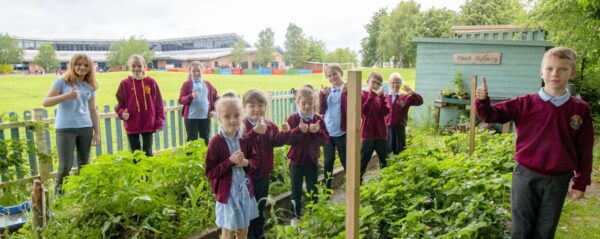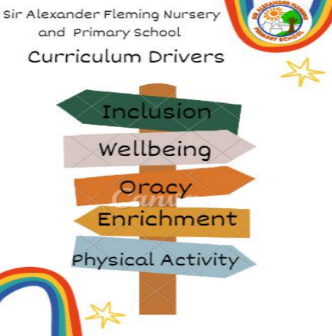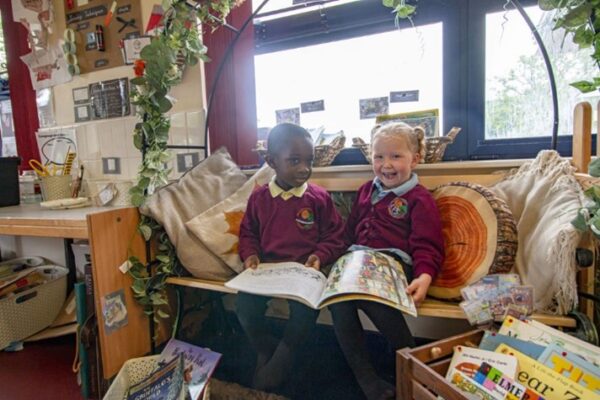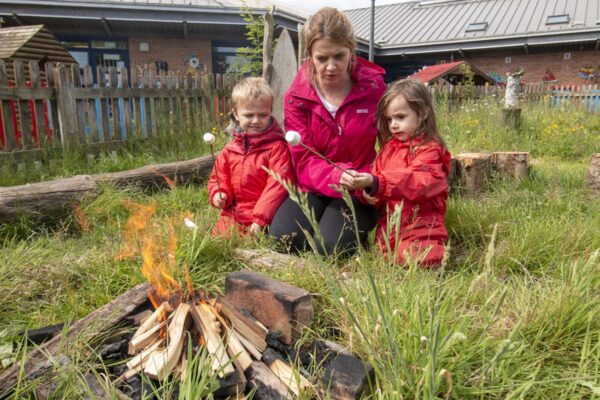
Our Curriculum Statement
At Sir Alexander Fleming Primary School and Nursery, we aim for all our children to leave equipped with key skills, which enable them to be confident, respectful, skilful, ambitious and positive individuals, who are reflective, able to make good choices and have a thirst for life and all it has to offer.
Our educational philosophy has the development of the whole child at its heart and we have shaped our curriculum to meet the needs of ALL our children. We believe that for a child to be successful academically, they must be self-assured both emotionally and socially. Consequently, our ethos and curriculum centres on developing the emotional and social well-being of every child so that they can meet the academic challenges and make positive contributions as future citizens. We strongly feel that to engage children, and for them to have a passion for learning, they need to see learning as enjoyable and contextually relevant to them. That is why, here at Sir Alexander Fleming, we use our pupil’s voice to support decision making. We regularly encourage our pupils to articulate their learning journey and understanding of the curriculum. This ensures that our children are actively involved in their learning, enabling them to deepen their understanding and develop retrieval strategies.

What are our curriculum drivers?

At Sir Alexander Fleming, we have five curriculum drivers that are central to our school vision and ethos. They help to drive and shape the curriculum and are incorporated across all subjects and themes.
Inclusion – Each learner is an individual and we use a child centred approach to adapting our teaching to meet their need. We make the following adaptations to the curriculum to ensure all pupils needs are met:
• Adapting our curriculum to ensure all pupils can access it, for example, by grouping, 1:1 work, teaching style, content of the lesson etc.
• Adapting our resources and staffing.
• Using recommended aids, such as laptops, coloured overlays, visual timetables, larger font etc
• Adapting our teaching, for example, giving longer processing times, pre-teaching of key vocabulary, reading instructions aloud, visual cues to accompany verbal instructions.
Wellbeing – We place emphasis on a curriculum that develops the whole child. Through our core values we ensure that the wellbeing of all members of the community is at the centre of our life in school and the key to raising academic success. Our children gain a sound knowledge of their own value and purpose, with the ability to make choices and decisions. Our children are given opportunities to share their values, opinions and beliefs with others. This teaches children that we all have a right to be heard and listened to and develops their sense of self-worth. It encourages pupils to develop their sense of identity, belonging, respect for and sensitivity to others, in particular those whose faiths and beliefs are different from their own.
Oracy – Our curriculum aims to develop learners who can think critically, reason together and have the vocabulary to express their knowledge and understanding. In all areas of learning, oracy is developed through peer discussion. Children are taught key vocabulary and terminology and are expected to use this fluently when sharing their ideas with others.
Enrichment – A range of trips, visits, experiences and visitors are planned across the curriculum. These are organised by teachers, to offer experiences that help to broaden the understanding of curriculum content, enrich the curriculum delivery with real-life experiences and most importantly help the children embed and retrieve their learning.
Physical activity – Sport England Survey shows that active children are happier, more resilient and more trusting of others and it’s also shown a positive association between being active and higher levels of mental wellbeing, individual development and community development. We build physical activity into all subjects.
Through our school values, ‘Respect, Safe, Pride, Brave and Succeed’, we ensure that the wellbeing of all members of the school community is at the centre of our life in school and the key to raising academic success. Our children gain a sound knowledge of their own value and purpose, with the ability to make choices and decisions in life that show their understanding of right and wrong.
Our creative and engaging curriculum, which has ambition for all, is mapped to include full coverage of the National and EYFS curriculum in a series of logical and sequential lessons. It provides a range of learning experiences for our children, which broaden their understanding of the Local, British and Global Community.

Our curriculum offer is designed and adapted, to challenge, engage and motivate our learners to take responsibility for themselves and others. Our desire being that they progress academically and personally so that they become respectful, successful and brave individuals, who make positive contributions to the community and society, both now and in the future.
We have developed our curriculum so that it is designed to support children retain subject knowledge and to evolve long-term memory skills therefore striving for them to learn more by understanding and remembering more.
“Leaders plan the curriculum carefully in a way that inspires and excites pupils. Links to the local and wider community further enhance the curriculum, which broadens pupils’ life experiences.” Ofsted March 2019

For all year groups, we have curriculum overviews that map out the content of the curriculum offer; these include all the subjects in the National Curriculum, so that our children access a broad and balanced curriculum offer.
Our curriculum ensures that it encompasses a wide range of knowledge so that children acquire the knowledge and skills to support them to become life-long learners who can be successful in the future.
Our curriculum is based on the substantive knowledge which includes the building blocks to support learning. Once these components have been acquired by the children, they are then able to use and apply them in a range of ways. Once substantive knowledge has been formed, our children are exposed to disciplinary knowledge, where they are able to apply their prior knowledge, such as exploring how historians investigate the past or geographers carry out fieldwork.

Using our curriculum overviews as a starting point, we develop our medium-term planning to ensure coherent coverage of key knowledge, skills and concepts and clear progression routes over a sequence of lessons. This allows for prior learning to be systematically built upon and key knowledge to be revisited. This is monitored by subject leaders and links to the Teaching, Learning and Assessment Policy. Curriculum planning is supported by carefully selected high quality texts, which stimulate children’s interests, give a context for learning and to make meaningful cross-curricular links to ensure knowledge is transferable.
A range of visits or visitors into school are linked to each topic – these are organised by teachers to offer a range of experiences to help broaden children’s understanding of curriculum content, enrich the curriculum delivery with real-life experiences and most importantly help the children embed and retrieve their learning. These visits are supported by the governors, who use some of the Pupil Premium Grant to match any short falls in parent voluntary contributions to ensure that all planned events go ahead.
The role of the subject leader is pivotal in the successful implementation of our curriculum. We aim for all subject leaders to have the knowledge, expertise and practical skill to be able to lead their area effectively. Each curriculum subject has a dedicated subject leader with clear roles and responsibilities. They are responsible for the curriculum design, delivery and impact in their own curriculum area. Subject leaders and leaders at all levels, including Governors, regularly review and quality assure the subject areas to ensure that they are being implemented as intended and that coverage, curriculum, breadth and balance is adequate.
Lessons make use of carefully formulated assessments of prior knowledge as a starting point for all future planning and teaching. We plan carefully tailored lessons which enable all groups of pupils to make good progress and catch up quickly, if needed. Staff also make use of the detailed whole school progression documents to assist with making accurate periodic judgements of pupil attainment and progress for all taught subjects.
At Sir Alexander Fleming, we want to:
• create an environment in which all children can experience success and thereby build self-confidence.
• develop the all-round potential of the children through the vehicle of a rich, broad, balanced and differentiated curriculum.
• help children to acquire intellectual skills and apply them.
• develop in children a positive attitude towards education as a continuing process
• develop children’s growth mindset and ability to embrace a challenge
• develop in children an awareness and understanding of our own and other cultures, religions, races and ways of life.
• challenge every child to achieve at the highest level they possibly can.
• create well-rounded individuals with the skills for a job for the future.
Our Curriculum
EYFS Curriculum Overviews
EYFS Curriculum Overview 2024-2025
EYFS Curriculum knowledge and vocabulary Autumn
EYFS Curriculum knowledge and vocabulary Spring
Our Super 5!
Year Group Curriculum Overviews
Year 1 Curriculum Overview 2024 – 2025
Year 2 Curriculum Overview 2024-2025
Year 3 Curriculum Overview 2024-2025
Year 4 Curriculum Overview 2024 – 2025
Year 5 Curriculum Overview 2024 – 2025
Year 6 Curriculum Overview 2024 – 2025